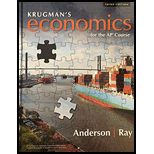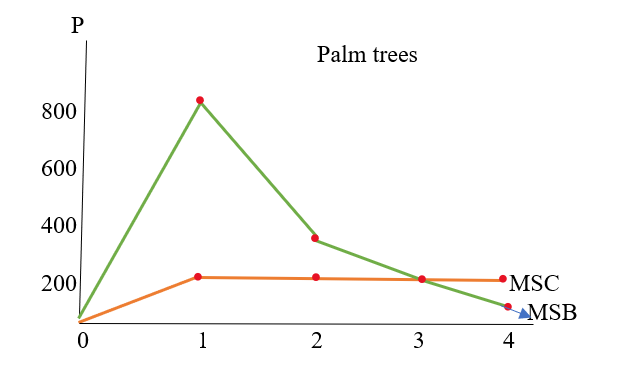
a)
Whether the purchase of palm trees creates a negative externality, a positive externality, or no externality.
a)
Explanation of Solution
The purchase of palm trees creates a positive externality because, with the plantation of trees, all people on the island will get the benefits of shelter, beauty, and erosion control. Therefore, planting the cost of trees can be bear by one person but it will provide benefits to the whole society which shows a positive externality.
Introduction: The benefits which are obtained by the third party who is not buying, selling, or consuming the good are called external benefits such as using a vehicle to travel that reduces the congestion on the road because it provides benefit to other drivers so that they can drive quickly and safely.
b)
The marginal
b)
Explanation of Solution
The marginal social cost and the marginal social benefit of palm trees on the graph are as follows:

Green curve represents the marginal social benefit curve and the orange curve shows the marginal social cost.
The data of the graph is obtained from the following table:
| Q of palm trees | Total social cost (total private cost) | Marginal social cost | Total private benefit or total social benefit | Marginal social benefit or marginal private benefit |
| 0 | $0 | $0 | $0 | $0 |
| 1 | $200 | $200 | 8 | 800 |
| 2 | $400 | $200 | 12 | 400 |
| 3 | $600 | $200 | 14 | 200 |
| 4 | $800 | $200 | 15 | 100 |
As the number of residents is 100, then marginal social benefit:
Introduction: Marginal private benefit is the benefit that is obtained by an individual by using an extra unit of the product. And, the marginal social benefit is the benefit that is obtained by the whole society as well as the individual by producing an extra unit of a product.
Marginal private cost is the cost that is incurred by an individual by using an extra unit of the product. And, the marginal social cost is the expense which is incurred by the whole society due to the production of an extra unit of a product.
c)
The number of palm trees that would be purchased if they were sold in a private market
c)
Explanation of Solution
In the private market, no tree would be sold at a price less than the cost and people will prefer to purchase where the price is minimum. And, for a quantity of 3 palm trees, the marginal social cost is equal to the marginal social benefit, which means 3 palm trees would be purchased if they were sold in a private market because after that cost will increase more than the benefit.
Introduction: Private market considers investments from individuals or companies which are non-government and it runs for profit where the state does not have any control over the companies.
d)
The socially optimal quantity of palm trees.
d)
Explanation of Solution
Social marginal cost and social marginal benefit are equal at the quantity of 3 palm trees which means 3 palm trees is the socially optimal quantity.
Introduction: The quantity where all the costs and benefits are accounted for is called socially optimal quantity.
e)
Whether palm trees are a private good, a public good, or a common resource
e)
Explanation of Solution
In this case, the palm tree is a public good because every person or resident of the island can benefit from these trees as they can enjoy shade, beauty, and erosion control. Moreover, palm tree, in this case, is not rival in consumption. Therefore, the palm tree is a public good.
Introduction: A public good covers both non-excludable as well as non-rival. And, a private good is excludable and rival in consumption which may prevent people from consuming when one person consumes the same good.
f)
The appropriate governmental policy response to this situation.
f)
Explanation of Solution
To increase social benefits and lower private costs, the government will use a policy that subsidizes palm trees because it will increase the number of trees to be purchased. This policy will provide more benefits to the whole residents of the island.
Introduction: Government policies are made to control the exploitation of resources and provide equal benefits to all citizens of the country at affordable costs.
Chapter 14R Solutions
Krugman's Economics For The Ap® Course

 Principles of Economics (12th Edition)EconomicsISBN:9780134078779Author:Karl E. Case, Ray C. Fair, Sharon E. OsterPublisher:PEARSON
Principles of Economics (12th Edition)EconomicsISBN:9780134078779Author:Karl E. Case, Ray C. Fair, Sharon E. OsterPublisher:PEARSON Engineering Economy (17th Edition)EconomicsISBN:9780134870069Author:William G. Sullivan, Elin M. Wicks, C. Patrick KoellingPublisher:PEARSON
Engineering Economy (17th Edition)EconomicsISBN:9780134870069Author:William G. Sullivan, Elin M. Wicks, C. Patrick KoellingPublisher:PEARSON Principles of Economics (MindTap Course List)EconomicsISBN:9781305585126Author:N. Gregory MankiwPublisher:Cengage Learning
Principles of Economics (MindTap Course List)EconomicsISBN:9781305585126Author:N. Gregory MankiwPublisher:Cengage Learning Managerial Economics: A Problem Solving ApproachEconomicsISBN:9781337106665Author:Luke M. Froeb, Brian T. McCann, Michael R. Ward, Mike ShorPublisher:Cengage Learning
Managerial Economics: A Problem Solving ApproachEconomicsISBN:9781337106665Author:Luke M. Froeb, Brian T. McCann, Michael R. Ward, Mike ShorPublisher:Cengage Learning Managerial Economics & Business Strategy (Mcgraw-...EconomicsISBN:9781259290619Author:Michael Baye, Jeff PrincePublisher:McGraw-Hill Education
Managerial Economics & Business Strategy (Mcgraw-...EconomicsISBN:9781259290619Author:Michael Baye, Jeff PrincePublisher:McGraw-Hill Education





